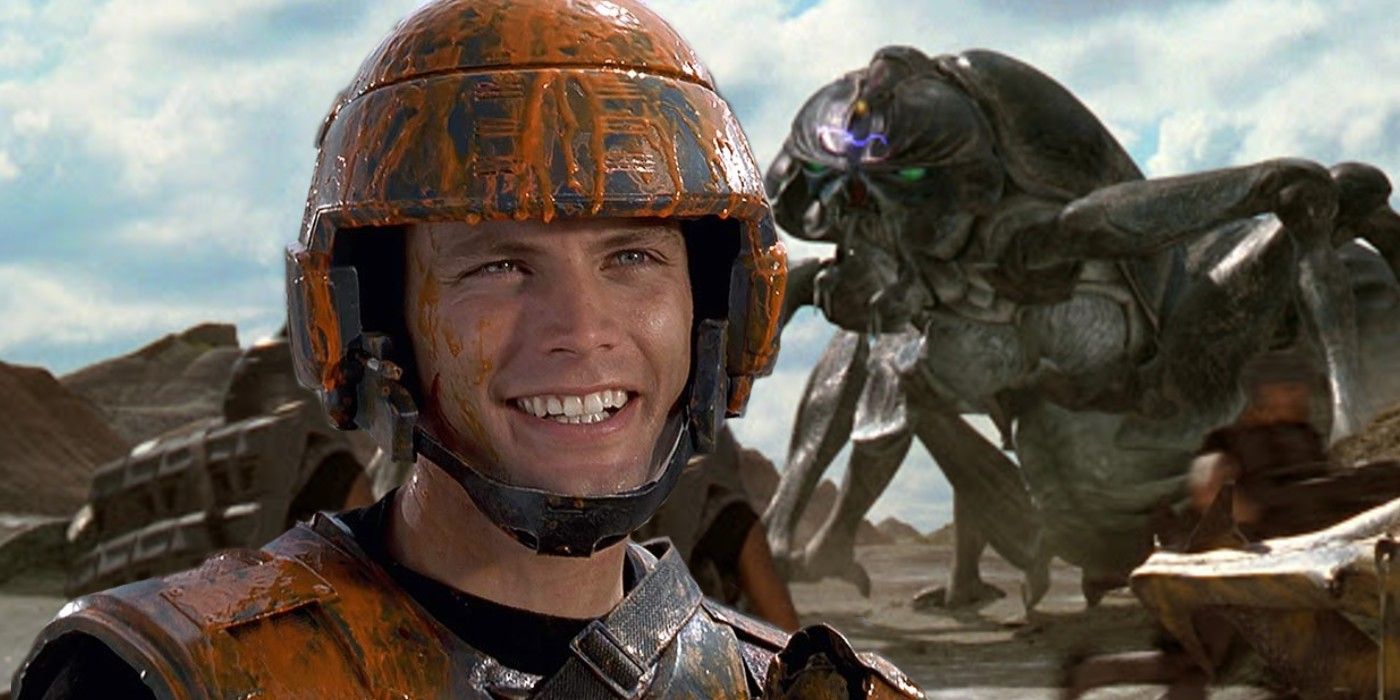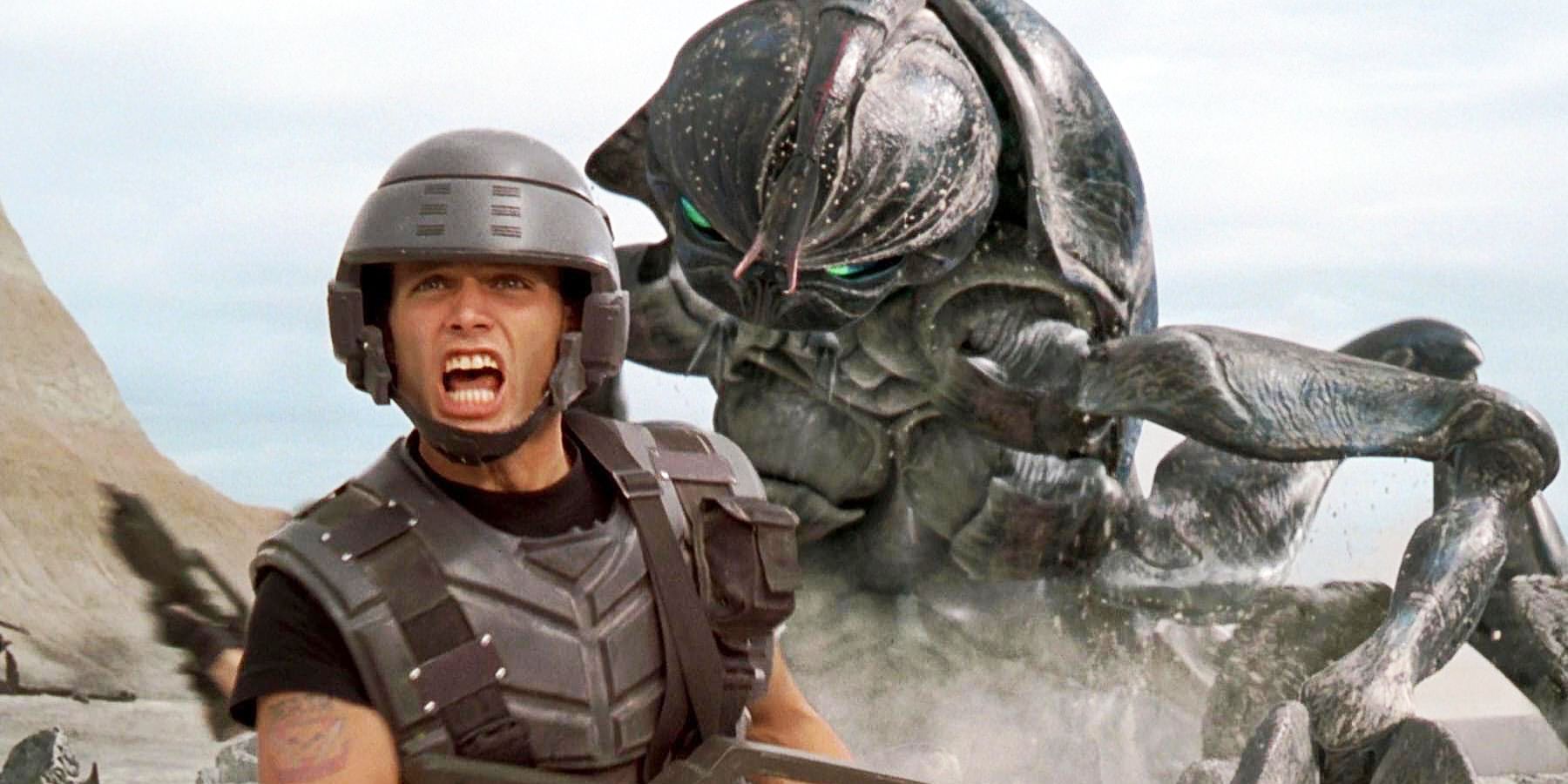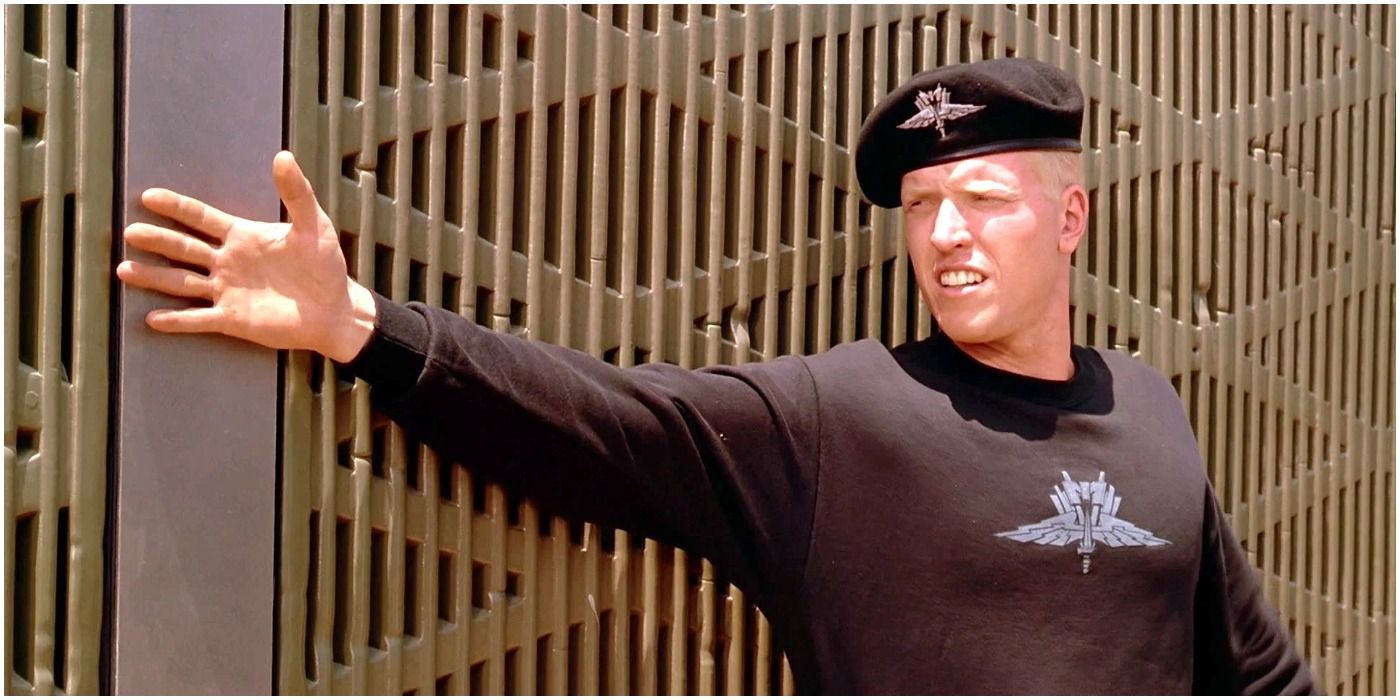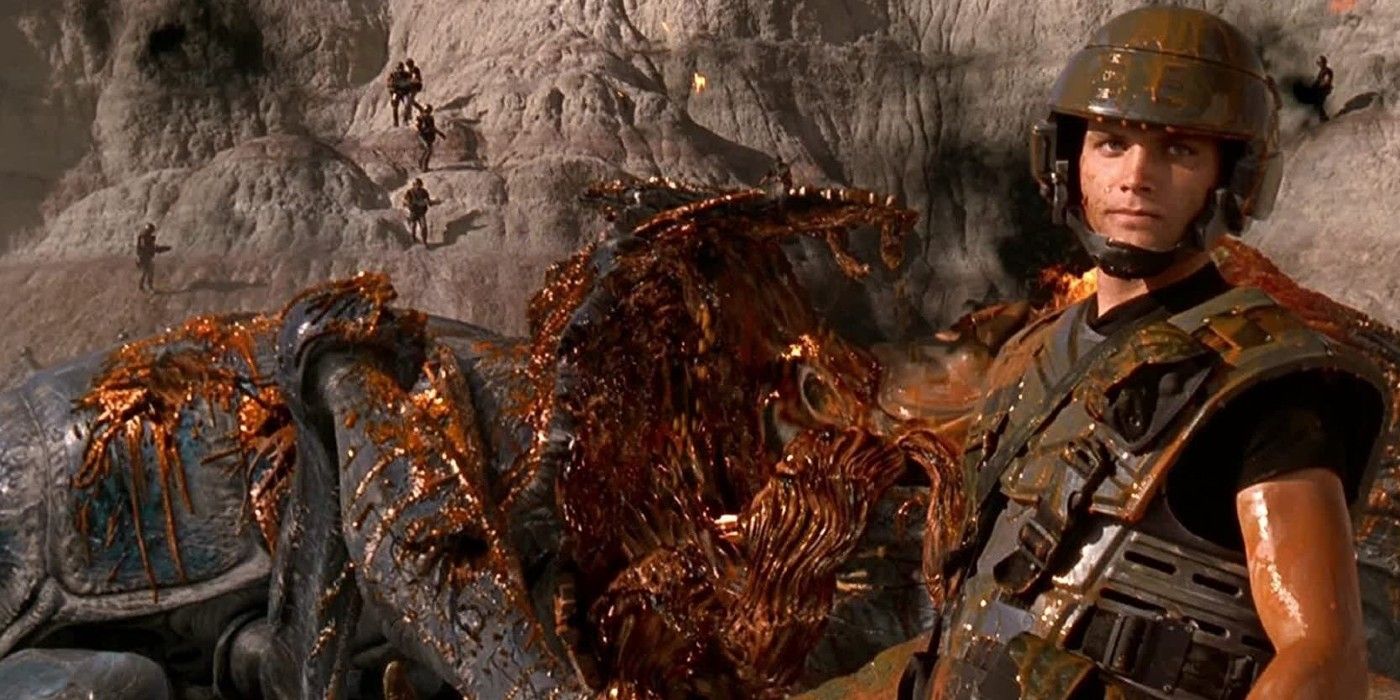When Starship Troopers was released in 1997, it was a box-office bomb. Despite opening at #1 and taking home over $22 million in its first week, the sci-fi movie eventually went on to only gross a total of $54.8 million in America against its $105 million budget. Starship Troopers was expected to be one of '97's biggest blockbusters but turned into a critical and box-office bomb and yet, only a decade later, the movie became a massive cult hit. And now, over 20 years after its release, the film has undergone numerous retrospectives, a reemergence in the streaming world, and has become a fan favorite. Here's what went wrong (and ultimately right) for the underappreciated masterpiece.
Starship Troopers was based on the 1959 novel of the same name by famed sci-fi author, Robert Heinlein. The book (and movie) depict a futuristic Earth that has to go to intergalactic war with an alien species known as "bugs". The story follows the protagonist, Rico, as he enlists in Federal Service after graduating high school to chase after his love, Carmen. Soon after enlisting, the bugs attack, forcing the world to go to war. Since release, there have been meditations on what Starship Troopers is really about,
Director Paul Verhoeven, famous for movies like Robocop and Total Recall, signed on to direct the film adaption. His movie had a fairly straightforward plot and a hit book to draw an audience from, so where did everything go wrong for the Starship Troopers movie and how did it manage to belatedly become a cult classic?
Why Starship Troopers Made No Money
One of the biggest problems for Starship Troopers was that the movie lacked any real A-list talent. A film starring a big name (like Brad Pitt) guarantees an audience because there's already a fanbase that will visit theaters simply to see him. But in Starship Troopers, the two biggest names were Denise Richards, who had never been the lead in a major movie before, and Casper Van Dien, who was best known as a side character in a soap opera. In short, regardless of why they were cast, neither was a big enough name to draw in an audience.
The timing of Starship Troopers' release was also problematic. The movie had its theatrical debut on November 7, 1997, just a few weeks before the lucrative holiday season began. After the movie's first weekend, which fared quite well, Starship Troopers began falling behind at the box office and during its second weekend, the movie only pulled in $10 million, a 54% drop. The next two weekends saw the release of Mortal Kombat: Annihilation and Alien: Resurrection - two movies that directly competed for Starship Troopers' target audience. And come December, holiday blockbusters like Scream 2, Tomorrow Never Dies, and Titanic were all released, which completely dominated not only the box-office but the entire cultural zeitgeist of the time. Starship Troopers was released during one of Hollywood's most highly-competitive seasons, which pushed the movie out of the top ten list in just a few short weeks.
But the biggest blow to Starship Troopers' box-office potential was the almost-universal disdain it received from critics. Any movie that opens to bad reviews is going to struggle to find an audience, especially ones that don't have an already-successful franchise to build on.
What Critics Didn't Understand About Starship Troopers
One of the main reasons the movie flopped was because it was radically different from the book. The novel revealed Heinlein's love of military life (he had previously been in the US Navy) and often glamorized war and recruitment. It was also pro-corporal punishment and capital punishment, pro-fascism, and preached for regimented structure and obedience by citizens. The film, on the other hand, was quite different. Director Paul Verhoeven grew up in the Nazi-occupied Netherlands and witnessed firsthand the destruction of a fascist regime that didn't respect human life. He wanted Starship Troopers to be subversive and to mock the militaristic "utopia" created in Heinlein's book and show it rather as a dystopia whose only purpose was to live for the next war. Verhoeven's choice immediately alienated and angered fans of Heinlein and confused critics who were expecting a traditional book-to-movie adaptation.
Furthermore, Heinlein's writing is considered to be hardcore sci-fi. His books are very much "genre fiction" and aren't the kind of novels that an average reader picks up at the bookstore. Because of this, a large majority of the critics and audiences who went to see the movie had never read Starship Troopers and were unable to position the movie in its proper context of being a commentary on the novel's militarism. Verhoeven designed a purposefully overexaggerated style to his movie. He wanted audiences to watch the film and notice that things were far from normal. To do this, he used and mocked many Nazi techniques throughout the film. The movie includes propaganda recruitment videos, a character wearing an SS uniform, and flags that have the Nazi Reichsadler at their center, among others.
In an interview with The Guardian, Verhoeven even admitted to purposefully only casting young, white, thin, and attractive actors to make the population seem like the Aryan race. Salon, however, missed this sly critique, instead assuming it was just another instance of Hollywood's vapid nature, and titled its review of the film "Melrose vs. the monsters." Verhoeven even took inspiration from Hitler propagandist Leni Reifenstahl, basing the movie's recruitment videos on her films. However, despite these techniques, the movie mostly plays it straight as a sci-fi action flick, similar to the way Scream both made fun of horror, but also was horror. Unfortunately, at that time, smart, self-aware, and satirical films weren't widely understood by critics or audiences, so many of Verhoeven's tactics were completely overlooked or misunderstood as poor attempts at mimicking Heinlein. Roger Ebert himself even misunderstood Verhoeven's vision, stating in his 2-star review, "He faithfully represents Heinlein's militarism, his Big Brother state, and a value system in which the highest good is to kill a friend before the Bugs can eat him..."
Another problem with Starship Troopers was its marketing, which was geared towards a young, male audience. When the film was screened for critics and released in theaters, nobody was anticipating a movie rife with political messages. Instead, critics considered it a dull action flick (The New York Times review said the movie was "for everyone who likes raw meat for breakfast...") and audiences saw it as just another movie with space battles. Nobody was prepared - or seemingly able - to take in the film for what it truly was.
How Starship Troopers Became a Cult Classic
Years after the film's debut, audiences started viewing the film in a new light as the Starship Troopers Honest Trailer proves. Since the film's release in 1997, the world has experienced the radical polarization of political parties, wars in the Middle East, raging nationalism, and a rise in fringe political groups. Viewers became much better equipped at seeing the connections and understanding that the movie had a deeper meaning than originally thought.
The movie's exaggerated style also became better-appreciated as the years went on. Starship Troopers' use of camp eluded most viewers back in the 90s. Camp has long been used for comedy in LGBTQ culture, but for the larger public, the term remained relatively unknown until recent years. Starship Troopers is camp because it hilariously mocks the absurdity of a culture ruled by fascism and militarism. At the time of release, mainstream audiences weren't familiar enough with the concept to appreciate the movie, but more recently, viewers and critics have revisited the film and praised its sly and humourous critiques of Heinlein's ideology.
Finally, audiences and critics alike have learned to better appreciate the fact that Starship Troopers is different from the novel. Heinlein's book came out in a post-WWII America that was knee-deep in the Cold War. The nation was undergoing a prosperous decade filled with nationalism and a feeling that America was undefeatable. In the decades since the book's release, the idea of American imperialism and perfectionism has radically changed. Presidents have been impeached, wars have been lost, and the reality of rampant discrimination has come to the forefront of societal debate. Nowadays, Heinlein's book is widely viewed through a much more critical eye than it was upon release. In large part, modern viewers wouldn't want a movie to glorify Heinlein's worldview and have learned to appreciate the wacky, bombastic dissent of Verhoeven's rebellious film adaptation.
Despite the critical blow and lackluster performance of Starship Troopers upon its initial release, the movie continues to get more appreciation with age. It's now praised as an intelligent sci-fi film too smart for its time that brilliantly satirized militarism, and is widely believed to be one of Paul Verhoeven's greatest. And with the world on the brink of another massive political and cultural divide, it's very possible that Starship Troopers will only continue to become more and more relevant.




